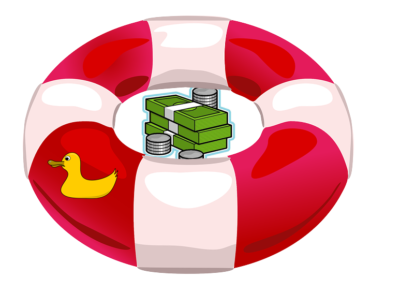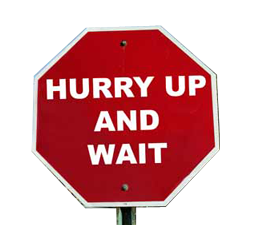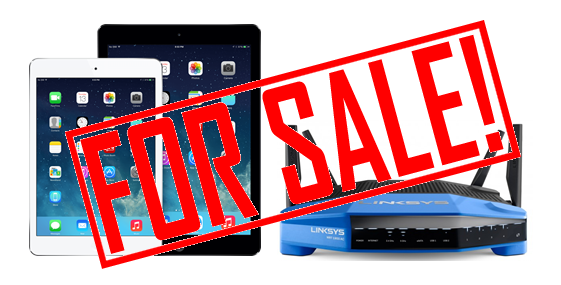Merchandise Reselling Lessons
I have been reselling merchandise on the internet for many many years. For a long time I would just opportunistically resell. For example, when the Google Chromecast was announced and went on sale the same day, I purchased a ton of them from Amazon. When they sold out later in the day, I sold them for twice what I paid and of course kept a couple for myself.
Perhaps I saw the writing on the wall for Serve or am just psychic, but I decided to start reselling in a much bigger way at the end of the year. Reselling on a small scale is so much different than doing it in a bigger way. Since scaling up I have learned quite a few lessons about these differences. Since I know a lot of you are considering reselling, I thought I would share some of my lessons learned.
It’s All About the Float

If you are going to resell in any meaningful way then prepare to float A LOT of money. With traditional MS I would float money for days and even sometimes weeks, but that was really because I was lazy. I could liquidate at any moment. With reselling, the cycle is much longer.
You are out the money the minute you purchase the merchandise and don’t get the money until weeks after Amazon sells it. (If you are using Amazon FBA.) Even if you get the merchandise right away and ship it to Amazon right away, it can take about a week for it to reach them and then another week or so for them to process it into inventory. Then of course it may not sell right away.
The way I see it you can approach the issue of float in two ways. Set aside an amount of money for buying and reselling and then keep your purchases in line with that. The other way is just go crazy and intermingle your personal funds with the business money. I ended up having to do this in December, but wouldn’t recommend it. In my case it was worth it because of the amount of deals I was finding, but it was a bit stressful.
Organization is Key & It Sucks
If you are going to resell in any meaningful way then organization is key. Not only do you need to track what you bought and for how much, you need to notate any portals, discounted gift cards, etc. Then you also need to reconcile your sales at the end with what you receive from Amazon. Don’t forget to account for shipping costs and supplies. Oh and then there are returns. Oy vey!
You can of course use spreadsheets to track much of this, but there is one tool I actually am paying for now that helps tremendously. It is called Inventory Lab. Inventory Lab interfaces with Fulfillment by Amazon and tracks much of what I mentioned above for you. You can enter in your cost of the item as you create the shipment and then Inventory Lab will track it through the process of being sold and tell you what you made.
While Inventory Lab doesn’t do 100% of the tracking for me, it does enough that I am willing to pay the $490 annual fee to use it. Thankfully there is a 30 day trial and I highly suggest giving it a try to see if it works for you. I’m so glad they gave me a free trial because I was hesitant to pay that much money for anything, but I quickly learned the time saved justifies the cost.
Note: If you sign-up for Inventory Lab with the links above then I receive $5. You can still get the 30 day trial by going directly to their website as well.
Time SUUUUUCK
Perhaps if you sell one or two things now then you might do it for little to no profit just so you can earn miles/points. Once you begin to do it on any large scale then you’ll quickly realize that there is so much time invested that you better be making a profit! This whole thing simply takes a lot of time.
You will spend time sourcing deals and then more time actually buying them. Of course then there is the time it takes to create a shipment and to research prices so you know what to sell your product for. Packing up everything and shipping it to Amazon is also a time suck. Then there is the record keeping too. You will of course get better and more efficient, but you simply will be investing too much of yourself for a simple breakeven proposition.
Don’t Be In a Rush to Sell

The mindset of the occasional seller (especially one who only cares about miles/points) is to sell for the lowest price to get the item out the door and the money in the bank. While I admit I still struggle with this, sometimes waiting for a price to rebound is worth it. There have been several times recently where I lost out on money because I sold myself short by lowering the price too quickly.
Amazon price tracking services like CamelCamelCamel and Keepa are a good way to see where the price has been and make an educated guess about where it will go, but they don’t track third party Amazon Prime prices so they aren’t perfect. Of course much of this comes down to skill and you get better as you go. Remember the goal should be a profit and not just to earn miles/points. Of course holding on to an item too long isn’t good either, so it is important to strike a balance.
Points (Rewards) Add Up Quickly
If you are reselling to make a profit, then you’ll notice that the miles/points (and store rewards) are a fantastic side effect. You will earn tons of points form portals and from the credit card rewards. Then there are new sign-up offers as well. If you are reselling enough then you won’t have to worry about meeting the minimum spend requirements on new cards. You will not only be spending a ton of money, but it is all legitimate. No manufacturing involved.
Conclusion
I actually learned much more than what I have listed and will share more insight with you as time goes on. For me, the transition to reselling a lot more has been fairly smooth given my background and overall experience, but there have been bumps. If you are considering reselling, keep in mind you can do as much or as little as you want. You can start slow and stay within your comfort zone. Just remember, that it can get involved and isn’t for everyone, but it can be quite lucrative.




[…] I planned this trip for this May but it would probably take someone 6 months or so to get all of this set up. It would be best to start this probably a year before your trip unless you are able to generate large amounts of spend. […]
[…] 5 Things You Absolutely Need to Know About Merchandise Reselling for Manufactured Spend! […]
Very good information. Lucky me I discovered your blog by chance (stumbleupon).
I’ve book marked it for later!
Welcome and let me know if you have any questions.
Do you worry at all about the tax obligation? Technically, you you should be claiming these sales as income and the sale (full sale price, NOT the profit) would be taxable. Just curious…
Hi Holly,
Yes reselling is a business and I choose not to talk about taxes, because everyone should consult their own tax professional. I am not a tax professional and thus don’t feel I should speak to that stuff. I do personally pay my taxes.
Thanks, Shawn. This has been on my mind a lot lately… mostly because I would really like to use this method. So, I called TurboTax customer support. (I use them to file my personal taxes.) The person I spoke with said that as long as you sell an item for less that what you paid you do not need to claim the sale on your taxes as income. They even emailed me the answer.
I am not a tax professional either so everyone should research this themselves but this is good enough for me. 🙂
I also found this http://budgeting.thenest.com/gift-card-taxable-sell-it-32761.html:
“Income Taxes on the Sale
When you sell gift cards, you may need to report the income you receive from the sale. If you are making a profit selling the gift cards, you are legally required to report the income on your taxes. Under IRS guidelines, you must pay taxes on all personal and business income. If you are selling a gift card you bought yourself, you aren’t required to report the income if you sell the card for less than you originally paid.”
Posting in case it is helpful to others.
Thanks for sharing. I agree that everyone should seek out advice from their own financial and legal professionals so they are comfortable with their requirements for taxes, etc. I appreciate the info!
Subscribe
[…] good warnings about this Reselling […]
Very nice intro. You said that you stayed away from talking about taxes since you are not a professional in that arena and everyone should consult their tax professional. Fair enough, but at least can you talk about how you deal with your own situation so that others can get some hint and ideas? That would be really helpful. Thanks.
I got in the points game about a year ago and have been accumulating cards and miles but have never MS’d. I kid you not, the week I was going to go for a NW Buxx card the recent changes were announced. The past few months I was considering starting MS’ing I felt like typical methods were going to die off soon. I am very interested in learning how to resell though so I hope this becomes a series. I’m willing to invest the time, but for me the biggest mystery is how to locate the deals to purchase.
Start at Sears, Kohls, Best Buy, and Slickdeals.
Subscribe
just cleared minimum spends for bonuses on 10 new credit cards within 45 days exclusively through re-selling. Has completely replace MS for me at vastly greater profits, but at a much greater time commitment than MS
That’s interesting, my experience was the opposite. I stumbled on the MS World after years of reselling. I have no use for points, but the cash was nice. I used portals for awhile, but my cards weren’t paying me to spend. Ironically, I was buying discounted gift cards to increase my profitability (probably lots of MSers on the other side of those transactions).
I find that MS takes much more time and effort than my reselling business (I am self-employed). Since I do a lot of OA (online arbitrage), it’s a pajama effort. I stay far away from Wallymart as much as possible. Cashiers everywhere seem much more concerned about my buying prepaid cards than they were about a carts full of the identical items.
Some MS techniques would have been wonderful when I started, since they act like fee free cash advances. I wouldn’t recommend anybody doing that if you can’t handle the float, but I carried a lot of high interest credit card float when I started.
[…] Read the full story at milestomemories.boardingarea.com […]
Do you differentiate between “the float” and cash flow? You say “you are out the money the minute you purchase the merchandise”, but are you really? You have charged it and may will not be out the cash for a month or two (depending on where you are in the credit card cycle).
Of course you need to still account for this to be sure you can always pay the credit card in full when the time comes.
Do you stop buying when the set aside money is actually gone from paying credit cards or when the exposure matches the set aside money?
You said that CCC does not track third party prices, but they do. They don’t differentiate between Merchant Fulfilled and FBA, but they definitely track third party prices. I don’t see that data on Keepa, though.
I don’t use IL because they don’t help with the most difficult part of accounting for my reselling business, cost. Yes I can input that, but I can just as easily do that in a spreadsheet or Access database. There are a number of data points I am concerned about that make up cost (points/cashback/rebates/discounted G/C, etc.) Amazon already provides all the sales/returns/fees data for free. Keep in mind that any cost reductions that the IRS isn’t concerned about (points for example) shouldn’t be included in your tax cost for resale. Mental notes on those may sway your profit calculation however.
Correct I simply meant to point out that they don’t track third party FBA prices separately. I’ll clarify that in the text.
As for Inventory Lab, it automatically reconciles the data with your sales and track returns, etc. Yes you can do everything yourself manually, but you will spend more than an hour a month reconciling sales data. My time is worth more than that so I see Inventory Lab as worth it.
I stayed away from talking about taxes since I am not a professional in that arena and everyone should consult their tax professional, however you make great points. Thanks Dave!